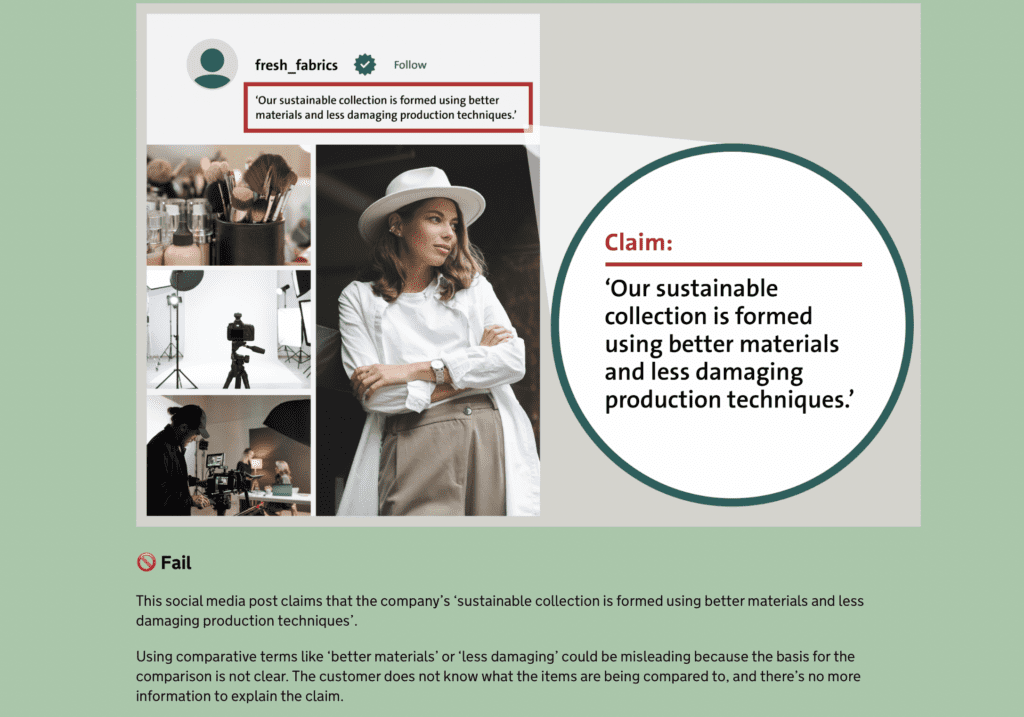A competition regulator in the United Kingdom is providing fashion companies with tailored “green” guidelines on the heels of alerting 17 “well-known” fashion brands of the need to ensure that they are not engaging in greenwashing by way of their advertising. The UK’s Competition and Markets Authority (“CMA”) released a “practical guide” based on its Green Claims Code, which it says is tailored to the fashion industry and that “aims to drive compliance with consumer law and create a level playing field for all fashion businesses” while also “help[ing] to make sure shoppers looking to buy green can trust that the claims they see.”
Fashion-Focused Green Guidelines
Among the most critical takeaways from the newly-issued guide, which the CMA says “focuses on retailers but is also relevant to those who manufacture or distribute products,” are that claims need to be “clear and accurate” and that they need to be substantiated by the advertising company, as well as other parties in its supply chain. In particular, the CMA states …
> Make clear & accurate claims: All green claims must be “clear and accurate” regardless of “whether they are made on a product (including on labels), in advertising, in store or online.” Advertising parties are encouraged to: (1) use plain language; (2) make it clearly visible; (3) present it in a way that customers “can easily understand;” and (4) put any qualifying or supporting language close to the relevant green claim(s).
The CMA maintains that “customers should not have to do something, like follow a hyperlink or scan a QR code, to find [qualifying or other related] information. It should be on the same side of a tag, or next to a claim on a website. It should not contradict the claim either.” The regulator notes that companies “can provide some types of supporting information separately to the claim, like on an adjacent tag.”


> Avoid green buzzwords: The CMA expects companies to avoid using unclear terms like “green,” “sustainable,” “eco-friendly,” etc. as they are “more likely to mislead customers into thinking that the product as a whole has a positive impact on the environment (or not a negative one, at least), which might not be true.”
> Be ready to back up green claims: Companies are encouraged to have internal processes in place, including “appropriate policies, regular training for staff, and systems to check your product listings are correct and that certain products meet advertised range criteria,” to make sure all green claims are accurate and do not mislead customers. The CMA states that companies should: (1) be able to back up any claims they make before they make them; (2) have robust, credible, relevant and up-to-date evidence that supports the claims; and (3) have internal processes in place to minimize and correct mistakes when listing products for sale.

> Suppliers should also substantiate claims: Companies suppliers should also be able to back up green claims with evidence, as well. “In the fashion sector, this evidence often includes final scope certificates or final transaction certificates,” according to the CMA. “Make sure your suppliers can provide relevant certificates on request,” the CMA states, noting that it is “good practice to carry out regular spot checks of certificates, check your suppliers have read and understood your policies about green claims, and verify that product information is accurate before you put it on sale.”
It further states that companies are responsible for “any claims made about third-party products [they] sell,” and that “each business in the supply chain is responsible for making sure its claims are accurate and appropriately substantiated.”
Warning Letters
In addition to releasing the new guidelines, the CMA revealed that it has advised 17 “well-known” – but unnamed – fashion brands to review their business practices. “These letters highlight areas of concern regarding their green claims, such as the use of broad or general terms and whether certain products are being wrongly included in ‘eco’ ranges,” according to the CMA. “The letters also remind fashion brands that the CMA will soon have strengthened consumer powers under the Digital Markets, Competition and Consumers Act 2024, which will “enable it to fine businesses up to 10 percent of their worldwide turnover if they break consumer law, meaning businesses should take steps now to make sure their claims are accurate and do not mislead shoppers.”














